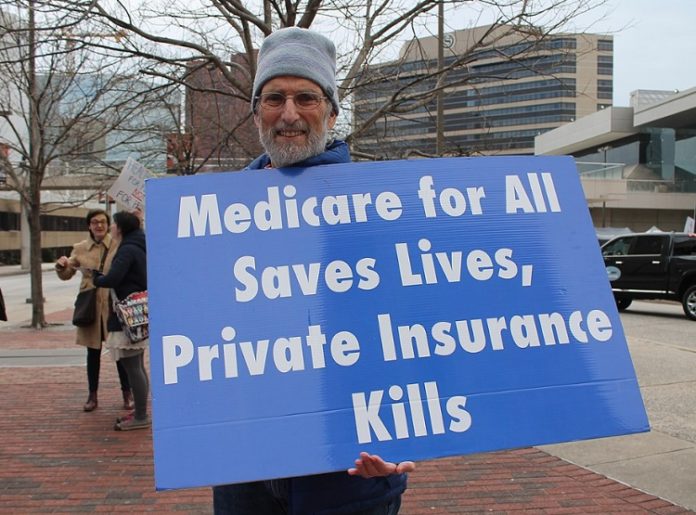The Medicare for All issue will determine the winner of the Democratic nomination and the 2020 presidential election. Healthcare costs are the most pressing economic concern of Americans.
Health care claims nearly 18% of the GDP — three times as much as food. A 3.5% unemployment rate, rather than 5.5%, affects only 2% of the U.S. workforce, temporarily, but the cost of health care affects everybody, continually. More than 40% Americans under age 65 are underinsured, and more than 12% have no healthcare insurance.
One way or another, we all end up paying for healthcare costs the underinsured can’t pay. Any candidate who can convince Americans he or she can and will ensure adequate health care for everyone will win the presidency.
Some critics believe Medicare for All is un-American. “It’s socialism,” they say. Others don’t it believe can be done. Others simply don’t believe anyone can convince Americans that it can be done. These critics are wrong.
First, Medicare for All is not socialism. We already recognize medical care as a basic human right. If a sick person can make it to an emergency room, we don’t deny them health care. The question is whether this is adequate protection of our right to health care.
The American Declaration of Independence clearly states that the basic purpose of government is to ensure the God-given, unalienable rights of the people. If we have a right to life, liberty and the pursuit of happiness, then we have a right to appropriate means of maintaining and restoring health. A right not ensured is a right denied.
Second, we can afford Medicare for All (MFA). We are already paying for it. We just aren’t getting it. We are already paying more for health care than the highest cost estimates for covering all healthcare costs under MFA. The total cost of health care in the U.S. was more than $3.6 trillion in 2018 and is projected to increase to $6 trillion by 2027.
Under MFA, people would simply pay for health care through a single government agency rather than paying insurance premiums, co-payment, deductibles and out-of-pocket costs.
About one-third of total U.S. healthcare costs are already being paid through various government healthcare programs. Even if current Medicare payroll deductions needed to be tripled, the increased deductions for a family with a $60,000 income would be only $140 per month. Taxes could be used to redistribute the costs.
All medical expenses, including hearing, dental and vision for everyone, would be covered. The single-payer MFA agency would have the power to bargain for lower drug costs, reduce costs of administration and replace costly emergency care with preventative care. Experiences of other countries suggest healthcare costs could eventually be reduced by up to one-half by moving to a single-payer system.
Critics label MFA as a “government-run healthcare system.” To the contrary, the healthcare system would the same private system we have today — the same doctors, same hospitals, same drugs, same outpatient services. The costs of these services would simply be paid through a government agency rather than through private health insurance companies or directly by patients.
Employers who currently provide health insurance benefits for workers and retirees would simply pay the MFA agency rather than private insurance companies. No employee or retiree currently covered by an employer insurance program would have their benefits reduced, and any insurance premiums they pay would be eliminated.
The only significant change would be that everyone would have complete healthcare coverage, including vision, dental and hearing, with no co-payments or deductibles.
Candidates who don’t feel Americans will accept MFA propose instead “Medicare for those who choose it” — that is, a public option. However, people must pay into health insurance programs when they are young and healthy if there is to be money in those programs to pay their medical expenses when the get old or sick.
Given a choice, young healthy people would be lured into choosing private health insurance by lower premiums associated with their lower current risks. However, their rates would be raised when they get sick or grow old — forcing them to choose the public option. Since they wouldn’t have paid into the public health insurance system when they are young or healthy, there simply wouldn’t be enough money in the system to cover their healthcare costs when they are old or get sick.
No healthcare system can afford to pay for pre-existing conditions if people are allowed to wait until they are sick to start paying into the system. A public option is simply not a logical choice.
I support Elizabeth Warren on this issue because I believe she has offered the most detailed, workable plan for implementing her proposals. However, no candidate will have a chance to implement Medicare for All unless they explain it in common-sense terms to the American people.
John E. Ikerd is professor emeritus of agricultural economics at the University of Missouri. He is the author of “Sustainable Capitalism,” “A Return to Common Sense” and “Small Farms are Real Farms.”

















